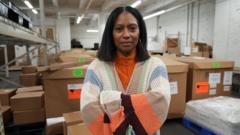As President Trump promises steep tariffs on imports, businesses across the US are revamping strategies to navigate potential economic fallout, with immediate effects already felt in various industries.
US Businesses Brace for Impact as Trump Targets Tariffs

US Businesses Brace for Impact as Trump Targets Tariffs
American firms prepare for economic turbulence as Trump announces new tariffs on imports.
---
As Donald Trump prepares to impose significant tariffs on both imports from China and close trading partners like Canada and Mexico, businesses are taking proactive measures to mitigate the expected economic fallout. Handbag designer Sherrill Mosee, who owns MinkeeBlue in Philadelphia, reflects the urgency many firms feel. Once content to wait on shipments of 2,700 bags, the changing political landscape has prompted her to expedite the arrival of these products.
Trump's recent statements suggest he intends to enact a 25% tariff on goods from Canada and Mexico, alongside a 10% surcharge on imports from China, where many products already face higher duties from previous administrations. While some analysts propose that these threats might merely be strategic moves within larger negotiations, the immediate reaction in the business community indicates rising levels of anxiety.
Chris Caton, Global Strategy Manager at Prologis, noted an increase in firms seeking warehouse space to stockpile goods in anticipation of these tariffs. Economist Wendy Edelberg from the Brookings Institution warns of potential price hikes and shortages, advising companies to brace for uncertainty regardless of whether the tariffs are ultimately enacted.
Retail brands like Steve Madden are already shifting their manufacturing strategies to reduce reliance on China, while Stanley Black & Decker discusses potential price increases as they prepare for the looming tariffs. Even corporate giants like Walmart are evaluating their next steps to remain competitive amidst these changes.
The experience of Martin Pochtaruk, CEO of Canadian solar panel producer Heliene, elucidates the steep costs of tariff imposition. His company faced severe challenges in 2018 due to similar tariffs, forcing it to adapt operations to mitigate risks associated with fluctuating costs, including foreign materials. The lingering uncertainty highlights fears among small business owners like Mosee, who recognize that even if tariffs don't materialize as projected, the possibility alone could hinder economic growth and consumer prices.
Economists believe that while tariffs might protect specific domestic industries, they tend to drive up overall costs for consumers and reduce employment growth. The National Retail Federation forewarns that retaliatory tariffs could impose a staggering burden on US consumers, resulting in higher prices across various product categories.
Despite Trump’s assurances that the planned tariffs will fuel job growth in U.S. manufacturing, conflicting economic signals loom larger. Experts voice concerns that any tariff policy could jeopardize access to essential goods, particularly as Trump proceeds with aggressive trade actions while also promising to lower costs for American consumers.
With uncertainty buzzing around future trade policies, small businesses like Mosee’s are pressured to consider reshaping their operational models—potentially adopting partnerships to endure the anticipated challenges. "It's going to be hard," she states, epitomizing the struggle many small enterprises are facing as they wrestle with the upcoming economic turbulence.
As Donald Trump prepares to impose significant tariffs on both imports from China and close trading partners like Canada and Mexico, businesses are taking proactive measures to mitigate the expected economic fallout. Handbag designer Sherrill Mosee, who owns MinkeeBlue in Philadelphia, reflects the urgency many firms feel. Once content to wait on shipments of 2,700 bags, the changing political landscape has prompted her to expedite the arrival of these products.
Trump's recent statements suggest he intends to enact a 25% tariff on goods from Canada and Mexico, alongside a 10% surcharge on imports from China, where many products already face higher duties from previous administrations. While some analysts propose that these threats might merely be strategic moves within larger negotiations, the immediate reaction in the business community indicates rising levels of anxiety.
Chris Caton, Global Strategy Manager at Prologis, noted an increase in firms seeking warehouse space to stockpile goods in anticipation of these tariffs. Economist Wendy Edelberg from the Brookings Institution warns of potential price hikes and shortages, advising companies to brace for uncertainty regardless of whether the tariffs are ultimately enacted.
Retail brands like Steve Madden are already shifting their manufacturing strategies to reduce reliance on China, while Stanley Black & Decker discusses potential price increases as they prepare for the looming tariffs. Even corporate giants like Walmart are evaluating their next steps to remain competitive amidst these changes.
The experience of Martin Pochtaruk, CEO of Canadian solar panel producer Heliene, elucidates the steep costs of tariff imposition. His company faced severe challenges in 2018 due to similar tariffs, forcing it to adapt operations to mitigate risks associated with fluctuating costs, including foreign materials. The lingering uncertainty highlights fears among small business owners like Mosee, who recognize that even if tariffs don't materialize as projected, the possibility alone could hinder economic growth and consumer prices.
Economists believe that while tariffs might protect specific domestic industries, they tend to drive up overall costs for consumers and reduce employment growth. The National Retail Federation forewarns that retaliatory tariffs could impose a staggering burden on US consumers, resulting in higher prices across various product categories.
Despite Trump’s assurances that the planned tariffs will fuel job growth in U.S. manufacturing, conflicting economic signals loom larger. Experts voice concerns that any tariff policy could jeopardize access to essential goods, particularly as Trump proceeds with aggressive trade actions while also promising to lower costs for American consumers.
With uncertainty buzzing around future trade policies, small businesses like Mosee’s are pressured to consider reshaping their operational models—potentially adopting partnerships to endure the anticipated challenges. "It's going to be hard," she states, epitomizing the struggle many small enterprises are facing as they wrestle with the upcoming economic turbulence.















